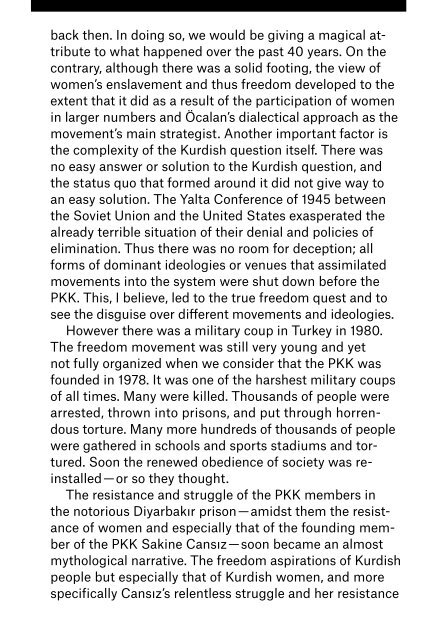Stateless Democracy
NWA5-Stateless-Democracy1.pdf?utm_content=buffer7beda&utm_medium=social&utm_source=twitter
NWA5-Stateless-Democracy1.pdf?utm_content=buffer7beda&utm_medium=social&utm_source=twitter
Create successful ePaper yourself
Turn your PDF publications into a flip-book with our unique Google optimized e-Paper software.
ack then. In doing so, we would be giving a magical attribute<br />
to what happened over the past 40 years. On the<br />
contrary, although there was a solid footing, the view of<br />
women’s enslavement and thus freedom developed to the<br />
extent that it did as a result of the participation of women<br />
in larger numbers and Öcalan’s dialectical approach as the<br />
movement’s main strategist. Another important factor is<br />
the complexity of the Kurdish question itself. There was<br />
no easy answer or solution to the Kurdish question, and<br />
the status quo that formed around it did not give way to<br />
an easy solution. The Yalta Conference of 1945 between<br />
the Soviet Union and the United States exasperated the<br />
already terrible situation of their denial and policies of<br />
elimination. Thus there was no room for deception; all<br />
forms of dominant ideologies or venues that assimilated<br />
movements into the system were shut down before the<br />
PKK. This, I believe, led to the true freedom quest and to<br />
see the disguise over different movements and ideologies.<br />
However there was a military coup in Turkey in 1980.<br />
The freedom movement was still very young and yet<br />
not fully organized when we consider that the PKK was<br />
founded in 1978. It was one of the harshest military coups<br />
of all times. Many were killed. Thousands of people were<br />
arrested, thrown into prisons, and put through horrendous<br />
torture. Many more hundreds of thousands of people<br />
were gathered in schools and sports stadiums and tortured.<br />
Soon the renewed obedience of society was reinstalled<br />
— or so they thought.<br />
The resistance and struggle of the PKK members in<br />
the notorious Diyarbakır prison — amidst them the resistance<br />
of women and especially that of the founding member<br />
of the PKK Sakine Cansız — soon became an almost<br />
mythological narrative. The freedom aspirations of Kurdish<br />
people but especially that of Kurdish women, and more<br />
specifically Cansız’s relentless struggle and her resistance<br />
in the face of the horrendous torture to which she was<br />
subjected, paved the way for women to play a major role<br />
in the days to come.<br />
While at the beginning, the women’s struggle within<br />
the PKK did not transcend the borders of the old left, it<br />
could also not be contained by them. Öcalan’s role here is<br />
important, both as a strategist and as the political leader<br />
of the Kurdish movement. He did not ignore the enslavement<br />
of women nor their desire and struggle for freedom.<br />
Despite negative reactions from some male members<br />
of the organization, Öcalan opened up political, social,<br />
cultural, ideological, organizational space for women.<br />
He stood strongly by this.<br />
Women joined the guerilla forces from the beginning<br />
because of the sexism they faced in feudal tribal structures<br />
as well as the fury they felt in the face of increasing<br />
colonialist and exploitative oppression against the Kurds by<br />
the Turkish Republic. People from all walks of life came to<br />
wage a common struggle. Yet coming together and joining<br />
a revolutionary movement was not on its own enough<br />
to overcome the attitudes inherited from colonialist and<br />
feudal structures. Problems began to emerge, especially<br />
in the approach towards women; there was an attempt at<br />
regenerating traditional roles amongst the guerilla forces<br />
and party structures. There were those women who accepted<br />
the regeneration of these roles and there were also<br />
women who rejected them. Thus, realizing the severity of<br />
the problem, the organization established the Union of the<br />
Patriotic Women of Kurdistan (YJWK) in 1987. The foundation<br />
of this union was the very first declaration of intent to<br />
target a unique and separate women’s organization.<br />
In the nineties, there was a huge influx of women in<br />
the guerilla forces. This compelled the formation of a new<br />
organization within the guerilla forces. In 1993, the very<br />
first all-women units were formed. This meant that women<br />
60–61


